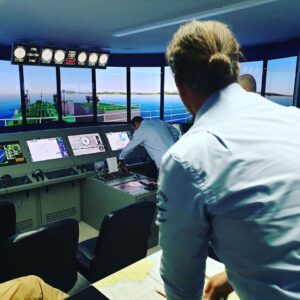
BRM/BTM BRIDGE SIMULATOR
COURSE CATEGORY: STCW
APPROVED BY: The Republic of Cyprus and the Republic of the Marshall Islands.


DURATION: 5 days
COURSE OBJECTIVES AND BENEFITS
This course is practical and theoretical and consists of a series of exercises performed on a ship handling simulator. It includes classroom lectures in order to provide the necessary theoretical background for the exercises. Particular items dealt with in these lectures are illustrated either by including them as part of an exercise or by a separate simulator demonstration. A lecture will deal with Bridge teamwork.
An instructor controls exercises and, initially, he allows the trainees to familiarize with the equipment, the controls and the instrumentation the simulator provides.
The exercises increase in complexity as the course progresses and as trainees become familiar with the maneuvering characteristics of the ship model and its response to the engine and helm in various conditions. The final exercises deal with the planning and execution of a coastal passage from port to port and will make use of the knowledge and skills learned in all of the previous exercises. The course introduces equipment failure or malfunction during the latest exercises to afford trainees practice in taking emergency preventive action and to practice on bridge teamwork in critical situations.
BRM/BTM Bridge Simulator course expects trainees to make use of effective bridge procedures during exercises, to comply with International Regulations for Preventing Collisions at Sea, 1972 (COLREG 1972) and to observe the basic principles of keeping a navigational watch, as set out in regulation VIII/2, section A-VIII/2 and B-VIII/2 of the STCW Convention and Code as amended. They will assume the different roles of the bridge watchkeeping team, and the roles will be rotated to allow each trainee an opportunity to act as master for some of the exercises.
A session for briefing will precede each exercise and a debriefing will follow
OBJECTIVE
The trainees who successfully complete this course will have gained experience in handling ships under various conditions and will make a more effective contribution to the bridge team during ship maneuvering in normal and emergency situations.
In particular, trainees will gain:
−familiarization with the use of engines and helm for ship maneuvering
−understanding of the effects on the behaviour of the ship of wind, current, shallow water, banks and narrow channels and condition of loading
−greater awareness of the importance of planning a passage or maneuver and the need for an alternative plan
−greater understanding and awareness of efficient bridge procedures and bridge teamwork during watchkeeping and ship handling; in normal and in emergency situations
−a greater awareness and understanding of a good interactive communication style and benefit of building up a common shared mental model of the planned passage


